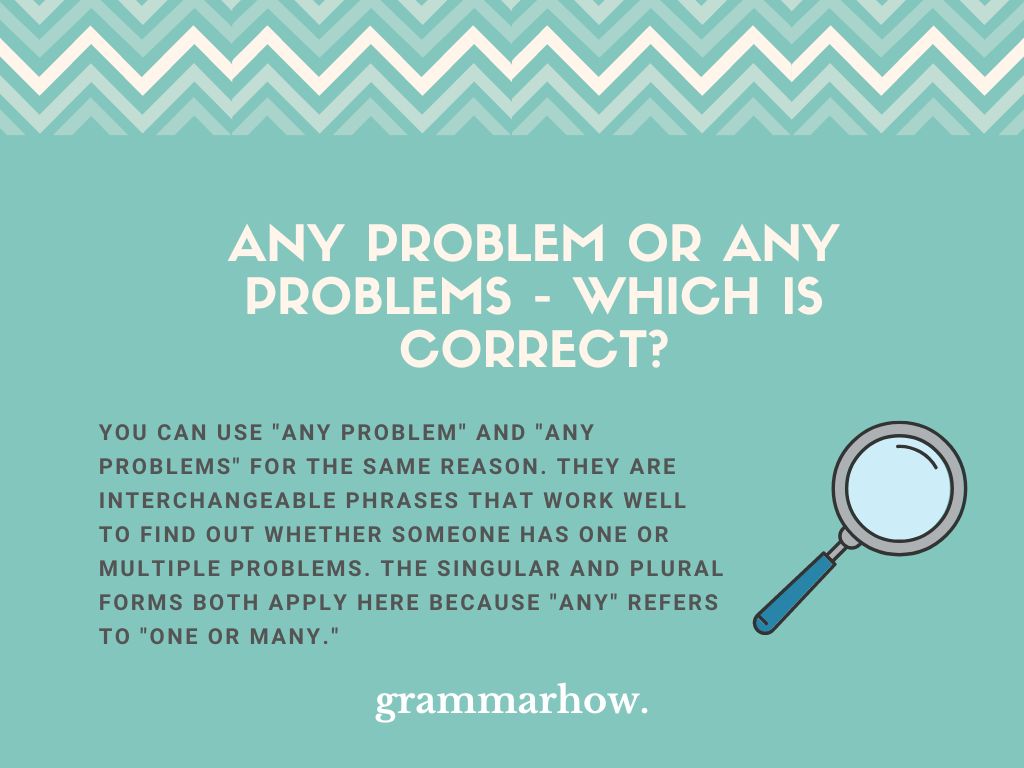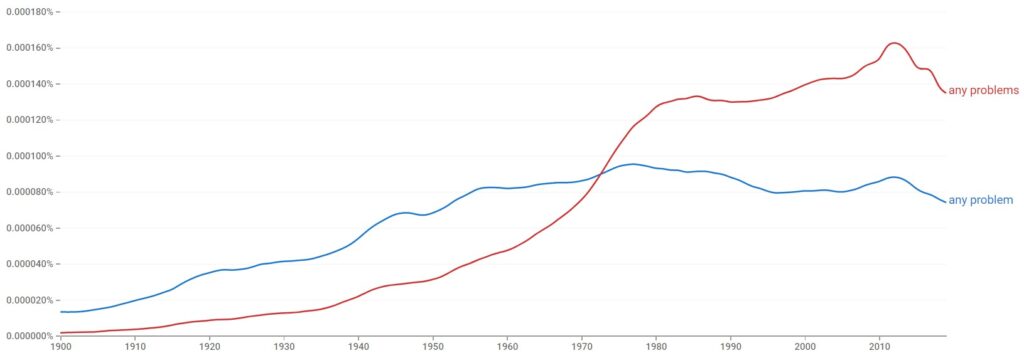“Any” is a useful word that can refer to one or many. Therefore, it technically applies to both the singular and plural forms of certain nouns. This article will look into whether you can use “any problem” or “any problems” and how the two forms work.
Any Problem or Any Problems – Which Is Correct?
You can use “any problem” and “any problems” for the same reason. They are interchangeable phrases that work well to find out whether someone has one or multiple problems. The singular and plural forms both apply here because “any” refers to “one or many.”

Most people stick with “any problems” because it feels much more natural. It sounds like the correct way to say it as “any” feels like it should connect to a plural form.
With that said, “any problem” is technically the “more correct” variation. It’s the one that follows the traditional rules associated with how “any” works in a sentence. Technically, the singular form should come after it, though this is an old-fashioned view.
Any Problem
“Any problem” is correct. You can use the singular form of “problem” here to show that someone might be suffering from one (or multiple) “problems.” Ideally, once you’ve asked about their problems, you’ll be able to help them fix them.
- I don’t have any problem with the things you’re suggesting. I’ll get to work with them right away.
- If you have any problem that needs mentioning, please let me know. I’ll see what I can do about it.
- Do you have any problem that you’re not telling me about? I’d like to know whether there’s something I can do to help.
- I will tell you if I have any problem. For the time being, I’ll be alright to continue working on this one alone. Thank you.
- She didn’t have any problem when I left her. Maybe she’s finally decided that she’s had enough.
- I didn’t have any problem until you came along. Now, I don’t know what to do about any of this. Fix it, please.
- I didn’t mention that I had any problem with this. I guess I wasn’t thinking about the solutions in the same way.
Any Problems
“Any problems” is correct, and most people consider it the more natural way of phrasing this sentence. It works well because it allows the plural form “problems” to ask whether someone has multiple issues going on that they’d like to mention.
Even though “problems” is plural, it can also be used to ask if someone has only one problem. The singular form still works here with “any problems.”
- I can’t seem to find any problems in your system. Are you sure there’s something else going on here? We need to be ready.
- I wanted to find out if she had any problems with him. I’m not sure if there’s something going on behind the scenes.
- If you have any problems, let me know. I’ll be happy to help you out with them, but you’ll have to let me know what’s wrong.
- I thought she didn’t have any problems with these questions. Maybe I was wrong about her. That’s a real shame.
- We didn’t have any problems until you did something to break the circuit board. Now, we can’t seem to work it out.
- There weren’t any problems before you decided to show up. I can’t believe how toxic you can be!
- There can’t be any problems before we send this out! We don’t want the public to think that they can’t trust us!
Which Is Used the Most?
According to Google Ngram Viewer, “any problems” is used more often than “any problem.” They are both fairly common, though, which shows that they’re both suitable options for native speakers.

You may notice that “any problem” was much more popular in the past. That’s because it follows the more old-fashioned rules where a singular form usually follows “any.”
Generally, “any problems” feels more natural for people to say. It feels like a plural form should follow “any,” so people stick with “any problems” in most situations.
Final Thoughts
“Any problem” and “any problems” are both correct. Since “any” means “one or many,” both the singular (“problem”) and the plural (“problems”) apply to it. Technically, “any problem” is grammatically correct, but “any problems” is more conceptually correct, and people prefer it.
You may also like: Any Question or Any Questions – Which Is Correct?

Martin holds a Master’s degree in Finance and International Business. He has six years of experience in professional communication with clients, executives, and colleagues. Furthermore, he has teaching experience from Aarhus University. Martin has been featured as an expert in communication and teaching on Forbes and Shopify. Read more about Martin here.
